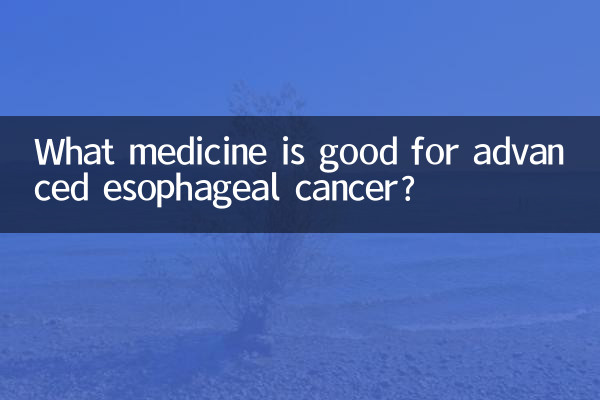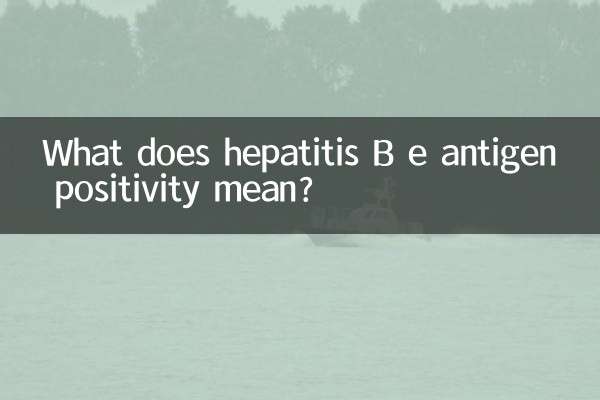What medicine is good for advanced esophageal cancer?
The treatment of advanced esophageal cancer is a complex process that usually requires a combination of surgery, radiotherapy, chemotherapy, targeted therapy, and immunotherapy. Medication plays an important role in advanced esophageal cancer, especially in patients who are unable to undergo surgery or radiation therapy. This article will combine the hot topics and hot content on the Internet in the past 10 days to give you a detailed introduction to the commonly used drugs and their effects for advanced esophageal cancer.
1. Commonly used drugs for advanced esophageal cancer

Drug treatment for advanced esophageal cancer mainly includes chemotherapy drugs, targeted drugs and immunotherapy drugs. The following are the drugs commonly used clinically in recent years and their mechanisms of action:
| drug type | Drug name | Mechanism of action | Indications |
|---|---|---|---|
| chemotherapy drugs | Cisplatin, carboplatin | Inhibits cancer cell proliferation by damaging DNA structure | First-line treatment of advanced esophageal cancer |
| chemotherapy drugs | Paclitaxel, docetaxel | Interfere with microtubule function and prevent cancer cells from dividing | Combined with cisplatin for advanced esophageal cancer |
| Targeted drugs | Trastuzumab (Herceptin) | Targeting HER2-positive tumors, blocking signaling | HER2-positive advanced esophageal cancer |
| Targeted drugs | Ramucirumab (Cyramza) | Inhibit angiogenesis and block tumor blood supply | Second-line treatment for advanced esophageal cancer |
| immunotherapy drugs | Pembrolizumab (Keytruda) | PD-1 inhibitors activate the immune system to attack cancer cells | PD-L1-positive advanced esophageal cancer |
| immunotherapy drugs | Nivolumab (Opdivo) | PD-1 inhibitors enhance T cell anti-tumor activity | Second-line treatment for advanced esophageal cancer |
2. Drug treatment options for advanced esophageal cancer
Medical treatment of advanced esophageal cancer usually requires a personalized plan based on the patient's specific circumstances. The following are common treatment options:
| treatment plan | drug combination | Applicable people |
|---|---|---|
| first line treatment | Cisplatin + Fluorouracil (5-FU) | Most patients with advanced esophageal cancer |
| First-line treatment (HER2 positive) | Trastuzumab + cisplatin + fluorouracil | HER2-positive advanced esophageal cancer patients |
| second line treatment | Ramucirumab or docetaxel | Patients after first-line treatment failure |
| Immunotherapy | pembrolizumab or nivolumab | PD-L1 positive or MSI-H patients |
3. Precautions for drug treatment of advanced esophageal cancer
1.individualized treatment: The treatment of advanced esophageal cancer requires a personalized plan based on the patient’s genetic test results, physical condition and tolerance.
2.side effect management: Chemotherapy drugs may cause side effects such as nausea, vomiting, and bone marrow suppression, which require symptomatic treatment; targeted drugs and immunotherapy may cause immune-related adverse reactions and require close monitoring.
3.combination therapy: Drug therapy is often used in combination with radiotherapy or surgery to improve efficacy.
4.clinical trial: For patients who are ineffective with conventional treatments, they may consider participating in clinical trials and trying new drugs or treatments.
4. Hot topic: Application of immunotherapy in advanced esophageal cancer
Recently, immunotherapy has become a hot topic in the field of advanced esophageal cancer. PD-1 inhibitors such as Keytruda and Opdivo have shown significant efficacy in clinical trials, especially in patients with PD-L1 positivity or microsatellite instability high (MSI-H). Experts suggest that patients with advanced esophageal cancer should undergo genetic testing as early as possible to determine whether they are suitable for immunotherapy.
5. Summary
There are various drug treatment options for advanced esophageal cancer, including chemotherapy, targeted therapy, and immunotherapy. Patients should choose the most suitable solution under the guidance of a doctor and pay close attention to drug side effects. As medicine advances, new drugs and combination therapies bring more hope to patients with advanced esophageal cancer.

check the details

check the details